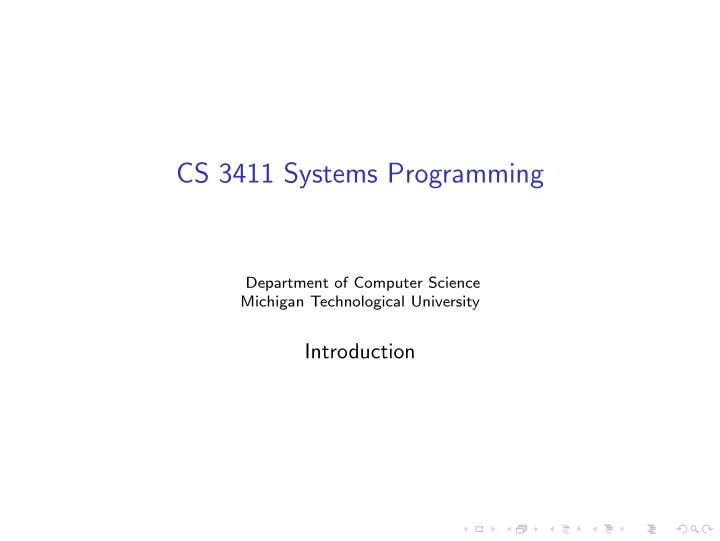

CS 3411 Systems Programming Department of Computer Science Michigan Technological University Introduction
Operating Systems ◮ We all use operating systems ◮ Operating systems interact with devices directly ◮ Provides programmer friendly interface by: ◮ Masking low level hardware interface ◮ Supplying abstractions ◮ Exporting a system call interface for user interaction with system resources ◮ Different for each operating system!
Operating Systems ◮ Operating systems also protect resources ◮ Data of one user from other users ◮ Memory of one program from another ◮ Keeps the processor from being monopolized
What is Systems Programming? ◮ Not a very well defined term! ◮ Part systems administration ◮ Includes: ◮ Creating and maintaining a platform for users ◮ Use the system call interface ◮ Code that operates in a privileged mode
Course Topics ◮ Review: C vs. C++ ◮ Unix file system interface ◮ Processes ◮ Linking, Libraries ◮ Interprocess communication ◮ Signals, pipes, sockets ◮ Terminal I/O ◮ Shell Programming ◮ Additional tools if time allows!
Course Text ◮ There is no REQUIRED course text ◮ We’ll be using slides and notes during class ◮ References: ◮ Advanced Programming in the UNIX Environment, W. Richard Stevens (Recommended text book). ◮ C: A Reference Manual, (5th ed.), Harbison and Steele ◮ UNIX Network Programming Volume 1, Networking APIs: Sockets and XTI, Second Edition, W. Richard Stevens
Grading ◮ Programs (5) - 55% ◮ 5 Slip days (cumulative for all assignments) ◮ After slip days used, 20% per day (including Saturday and Sunday) ◮ All submissions on Canvas! ◮ Tests (3) - 45% ◮ No final exam
Programming Expectations ◮ Work independently! ◮ Don’t show your code to anyone ◮ Don’t look at code from anyone (including on the Internet!) ◮ Can have ’empty hands’ discussions ◮ No copying code from Web unless explicitly stated ◮ Make an effort to design and debug your own code! ◮ Read manuals!
Programming Expectations ◮ For program assignments to get full points, it must: ◮ Perform specified function correctly ◮ Always terminate normally (except on certain signals) ◮ Program is responsible for checking the sanity of input! ◮ Avoid internal errors, e.g, memory leaks, buffer overflows, etc. ◮ Reasonably efficient ◮ Well documented and well formed ◮ Unless otherwise specified, assignments must be done in C and will be graded on a Linux system ◮ You may use your own machine for development, but make sure your code runs on the lab machines!
Recommend
More recommend